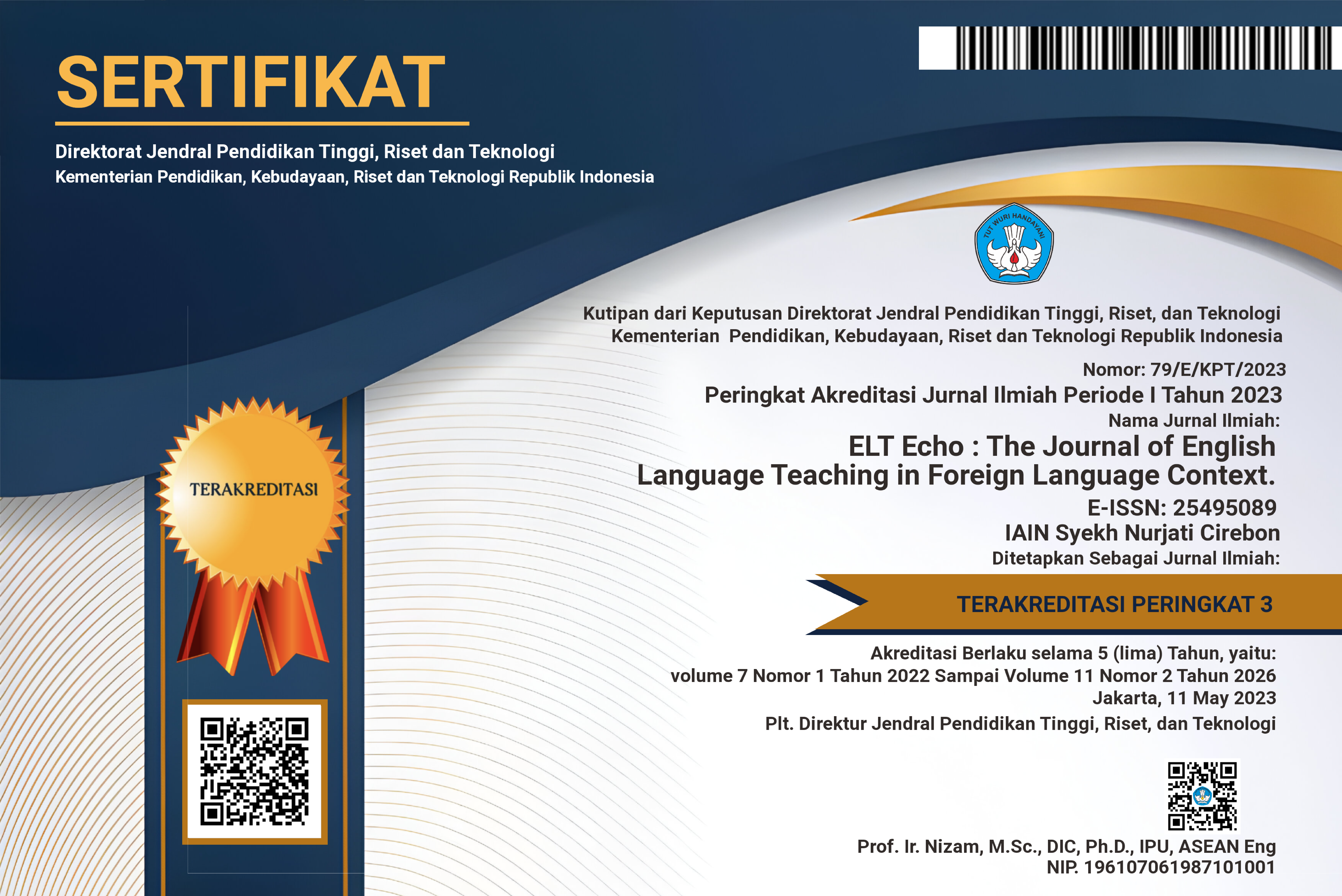STUDENTS’ PERCEPTIONS TOWARDS THE IMPLEMENTATION OF EFL MULTICULTURAL-BASED READING ACTIVITIES IN A HIGHER EDUCATION SETTING
(1) Universitas Negeri Yogyakarta
(*) Corresponding Author
Abstract
Keywords
Full Text:
PDFReferences
Abdulrahman, T., Usu, N.R., & Tanipu, Z. (2016). Teachers’ Perspectives on the Integration of Culture and EFL. https://doi.org/10.22236/jer_vol1issue2pp180-193
Al-Jarf, R. (2015). Enhancing Reading and Speaking Skills in EFL through Multicultural Children's Short Stories.
Alfulaila, N., Haryadi, H., Sudrajat, A., Nashrullah, N., & Banjarmasin, U.A. (2019). The Effectiveness of Multicultural Approach In Writing Achievement of Indonesian Language Among Elementary School Students.
Banks, J. (1989). APPROACHES TO MULTICULTURAL CURRICULUM REFORM. Social studies and the young learner, 5, 43-45.
Banks, J. (1993). An introduction to multicultural education.
Bloom, B. S., Engelhart, M. D., Furst, E. J., Hill, W. H., & Krathwohl, D. R. (1956). Taxonomy of educational objectives: The classification of educational goals. Handbook I: Cognitive domain. David McKay Company.
Byram, M., Gribkova, B., & Starkey, H. (2002). Developing the intercultural dimension in language teaching: A practical introduction for teachers. Council of Europe.
Byram, M., & Wagner, M. (2018). Making a difference: Language teaching for intercultural and international dialogue. Foreign Language Annals, 51(1), 140-151. https://doi.org/10.1111/flan.12319
Cai, M. (2022). Multicultural literature education: A cross-cultural perspective. Routledge.
Cai, M. (2022). Multicultural literature for children and young adults: Reflections on critical issues. Routledge.
Chaika, O. (2023). Key advantages of multiculturalism for foreign language teaching and learning. Humanitarian Studios: Pedagogics, Psychology, Philosophy.
Chaika, O. (2022). Technology of Dialogic Interaction as a Means of Fostering Polyculturalism with Future Foreign Language Teachers. [Technology of Dialogic Interaction as a Means of Fostering Polyculturalism with Future Foreign Language Teachers.] Humanitarian Studios: Pedagogics, Psychology, Philosophy, 13 (3), 103-111. http://dx.doi.org/10.31548/hspedagog13(3).2022.103-111
Creswell, J. W. (2012). Planning, Conducting, and Evaluating Quantitative and Qualitative Research. Boston: Pearson Education, Inc.
Dabou, S.P., Hammoudi, A., & Chibani, R. (2021). Teachers and Students’ Attitudes towards the Integration of the Target Culture in the English as a Foreign Language Class: A Case Study. International Journal of Linguistics, Literature and Translation. https://doi.org/10.32996/IJLLT.2021.4.4.28
Dorn-Medeiros, C.M., Christensen, J.K., Lértora, I.M., & Croffie, A.L. (2020). Relational Strategies for Teaching Multicultural Courses in Counselor Education. Journal of Multicultural Counseling and Development, 48, 149-160. https://doi.org/10.1002/jmcd.12174
Facione, P. A. (2015). Critical thinking: What it is and why it counts. Insight Assessment.
Gomez Rodriguez, L. F. (2013). Enhancing intercultural competence through U.S. multicultural literature in the EFL classroom. Folios, 38, 95-109. https://www.redalyc.org/comocitar.oa?id=345932041007
Hanemann, U., & Scarpino, C. (2016). Literacy in Multilingual and Multicultural Contexts: Effective Approaches to Adult Learning and Education.
Hellerstein-Yehezkel, D. (2017). The path to reading comprehension through intercultural competence in the multicultural EFL classroom. Language and Intercultural Communication, 17, 323 - 343. https://doi.org/10.1080/14708477.2016.1261875
Hooda, D.J. (2022). English language and globalization: A comprehensive analysis. International Journal of Arts, Humanities and Social Studies. https://doi.org/10.33545/26648652.2022.v4.i2a.89
Jackson, A.P. (2018). Boys and Girls for Others. GATESOL in Action Journal. https://doi.org/10.52242/giaj.v28i1.79
Jiang, L., & Matsumura, L. C. (2023). Exploring the relationship between critical thinking and intercultural communicative competence in EFL classrooms. System, 114, 102946. https://doi.org/10.1016/j.system.2023.102946
Karimi, F., & Nafissi, Z. (2017). Effects of Different Culturally-Based Materials on EFL Learners’ Reading Anxiety, Reading Self- Efficacy, and Reading Proficiency in Project-Based Classes. https://doi.org/10.22054/ILT.2017.8420
Kim, J.S. (2017). Rethinking Discourses of Diversity: A Critical Discourse Study of Language Ideologies and Identity Negotiation in a University ESL Classroom.
Kramsch, C. (2020). Language as symbolic power. Cambridge University Press.
Kramsch, C. (2020). Language and culture in second language learning. In The Routledge handbook of language and intercultural communication (pp. 40-52). Routledge.
Kubota, R. (2004). Critical multiculturalism and second language education. In B. Norton & K. Toohey (Eds.), Critical pedagogies and language learning (pp. 30-52). Cambridge University Press.
Kubota, R. (2010). Critical Multicultural Education and Second/Foreign Language Teaching.
Kuo, J. M. (2014). Critical literacy in the EFL classroom: Evolving multiple perspectives through learning tasks. Journal of Asia TEFL, 11(4), 109-138.
Kuo, N. C. (2014). Why is response to intervention (RTI) so important that we should incorporate it into teacher education programs and how can online learning help? Journal of Online Learning and Teaching, 10(4), 610-624.
Lawrence, S.A., Johnson, T.A., Baptiste, M., Caleb, A.B., Sieunarine, C., & Similien, C. (2017). Pre-Service Teachers’ Use of Multicultural Literature. Journal of Inquiry and Action in Education, 9, 3.
Li, X., & Chen, Y. (2021). The impact of multicultural literature on EFL learners' critical thinking skills: A longitudinal study. Teaching and Teacher Education, 98, 103234. https://doi.org/10.1016/j.tate.2020.103234
Li, X., & Chen, Y. (2021). A study on the application of multicultural literature in college English teaching. Theory and Practice in Language Studies, 11(1), 60-67.
Liaw, M. L. (2007). Content-based reading and writing for critical thinking skills in an EFL context. English Teaching & Learning, 31(2), 45-87.
Mehrajuddin, M., & Wani, S.H. (2022). Importance of English Language in Present Epoch. International Journal of Research Publication and Reviews.
Michaud, M., Colpitts, B.D., Matthew, M., & ColpittsBradleyD., F. (2015). English as a Lingua Franca: Globalization, Ownership, and the Diversification of English. Kwansei Gakuin University humanities review, 20, 125-131.
Miftakh, F. (2019). Intercultural Teaching and Learning English through Reading Skill. SALTeL Journal (Southeast Asia Language Teaching and Learning). https://doi.org/10.35307/SALTEL.V1I2.12
Murmu, A. (2022). The Importance of English Language in Contemporary Life. Global Research Journal. https://doi.org/10.57259/grj4685
Paul, R., & Elder, L. (2019). The miniature guide to critical thinking concepts and tools. Rowman & Littlefield.
Parker, J.L. (2019). Multicultural Education as a Framework for Educating English Language Learners. https://doi.org/10.32674/JIMPHE.V4I1.1404
Pavlova, L.V., Vtorushina, Y.L., & Baryshnikova, Y.V. (2023). DEVELOPING CRITICAL THINKING SKILLS OF STUDENTS ON THE BASIS OF INTERCULTURAL READING. Modern Problems of Science and Education. https://doi.org/10.17513/spno.32522
Schkinder, K. (2024). The crucial role of English language in intercultural communication within global healthcare. International Science Journal of Education & Linguistics. https://doi.org/10.46299/j.isjel.20240301.07
Shtyrlina, E.G., Palekha, E., & Kapralovа, J.V. (2020). Educational Potential of Multicultural Language Teaching (on the Russian Language Teaching Experience). International Journal of Criminology and Sociology. https://doi.org/10.6000/1929-4409.2020.09.106
Sinaga, T., Munifatullah, F., & Hartatiningsih, D. (2023). Culture and EFL Instruction: How do Eight Graders Perceive Multicultural Reading Activities in their EFL Classrooms? Scholars International Journal of Linguistics and Literature. https://doi.org/10.36348/sijll.2023.v06i02.005
Sobkowiak, P. (2016). Critical thinking in the intercultural context: Investigating EFL textbooks. Studies in Second Language Learning and Teaching, 6, 697-716. https://doi.org/10.14746/SSLLT.2016.6.4.7
Stake, R.E. (2010). Qualitative Research: Studying How Things Work. New York: The Guilford Press.
Thomas, K., & Choi, M. (2017). USING MULTIPLE TEXTS TO TEACH CRITICAL READING SKILLS TO LINGUISTICALLY DIVERSE STUDENTS. Indonesian EFL Journal. https://doi.org/10.25134/IEFLJ.V5I1.1626
Yang, L., & Qiu, Y. (2020). Enhancing critical thinking in EFL learning: The effects of multicultural literature instruction. Thinking Skills and Creativity, 38, 100749. https://doi.org/10.1016/j.tsc.2020.100749
Yang, W., & Qiu, L. (2020). A study on critical reading teaching in EFL classroom from a multicultural perspective. Theory and Practice in Language Studies, 10(9), 1123-1131.
DOI: 10.24235/eltecho.v9i1.17874
Article Metrics
Abstract view : 77 timesPDF - 14 times
Refbacks
- There are currently no refbacks.
Â
This Journal is indexed by:
Â

This work is licensed under a Creative Commons Attribution 4.0 International License.










